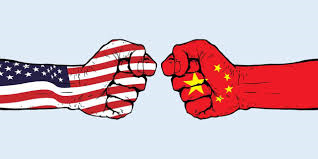Let the trade wars begin.
Trump supporters should be rejoicing. You voted for him because he projected the
image of the tall, tough-talking, take-no-BS, swaggering, arm-twisting,
ultimate deal-making man's man and force-to-be-reckoned-with. Well, your man says that winning a trade war
is easy, so let's rumble with China! After
all, China STARTED this war, what with all their unfair trade practices.We don't know for certain how this will all pan out. Granted, there is a possibility that the Chinese might roll over and play dead. But that's not very likely. A far more plausible outcome is that this trade war will sink the U.S. economy, AND take a good chunk of the global economy down with it. (The stock market took a huge drop when the trade war was announced.) And Your Favorite Blogger is not the only one who is worried; see this article in the Washington Post, or David Stockman's article on LewRockwell.com.
I addressed many of the anti-free trade arguments in my article "Is this the way to promote free trade?" Today we will pick apart more of these bogus arguments, beginning with the charge that the Chinese don't respect intellectual property rights.
Intellectual property (IP) violation is a global problem that has existed since the dawn of time. It happens anywhere and everywhere, and always has. The rise of the internet has only compounded the problem. I am not saying that we should just give up the fight, or that the whole concept of "intellectual property" is bogus from the get-go. But this is not just a Chinese issue; Americans are just as guilty, and I don't hear a peep from Trump about that. The solution to protecting IP is multi-faceted, and involves technology, education, public attitudes, and even re-thinking business models. Businesses might have to do a risk assessment and determine whether IP theft in some foreign locality is so prevalent that it's just not worth going there.
And yes, legislation plays a role, also. I've always maintained that protecting property from theft is a legitimate function of government, and that includes IP. But the power and effectiveness of government, at any level, ends at its border. The U.S. government's attempts to enforce any kind of edict on a foreign nation, IP-related or otherwise, will always be futile. There are people all over the planet, both governmental AND private, that do things we don't like. For most of the last century, our government has tried to change them via wars, invasions, embargoes, sanctions, and other methods. (See: Cuba.) It always ends up costing us all mountains of dollars and lives, and in the end, nothing changes. So no, cranking up a trade war over IP infringement is definitely not wise.
The other claim is that the Chinese government subsidizes domestic business, which makes it difficult or impossible for American businesses to compete. But this argument has no merit. If the Chinese people pay taxes so that Chinese businesses can sell their products at a low price, then that is a benefit for American consumers. In essence, Chinese citizens are subsidizing American buyers! True change can only start when the Chinese understand that their government is ripping them off.
Furthermore, as I pointed out in another article "Deliver us from competition", no business should expect a competition-free future. Yeah it sucks when some other company starts selling a better product or at a lower price than you. But our government has no obligation to ward off your competitors, and that applies regardless of where some arbitrary borderline falls. Competition is good, and the U.S. government should allow consumers and businesses to take advantage of it if it saves them money - not start a trade war over it.
Finally, let us not be dragged into a trade war because we disagree with some other country's policies. As I stated in my article on free trade:
"America is supposed to be the
good guys - the role model. We should be
the ones demonstrating what a free market is really like, and showing the world
how much wealthier and stronger our economy is, because our government gets the
hell OUT OF THE WAY and lets the market do its magic. We should be preaching the gospel of freedom
and minimal government, and working hard to convince the rest of the world that
THIS is way to promote stability and a high standard of living. Instead, we keep getting it backwards. We let the rest of the world, including all
those socialist, fascist, communist, tyrannical, despotic, corrupt, inefficient,
busybody, despicable governments convince US to do it THEIR way."

No comments:
Post a Comment